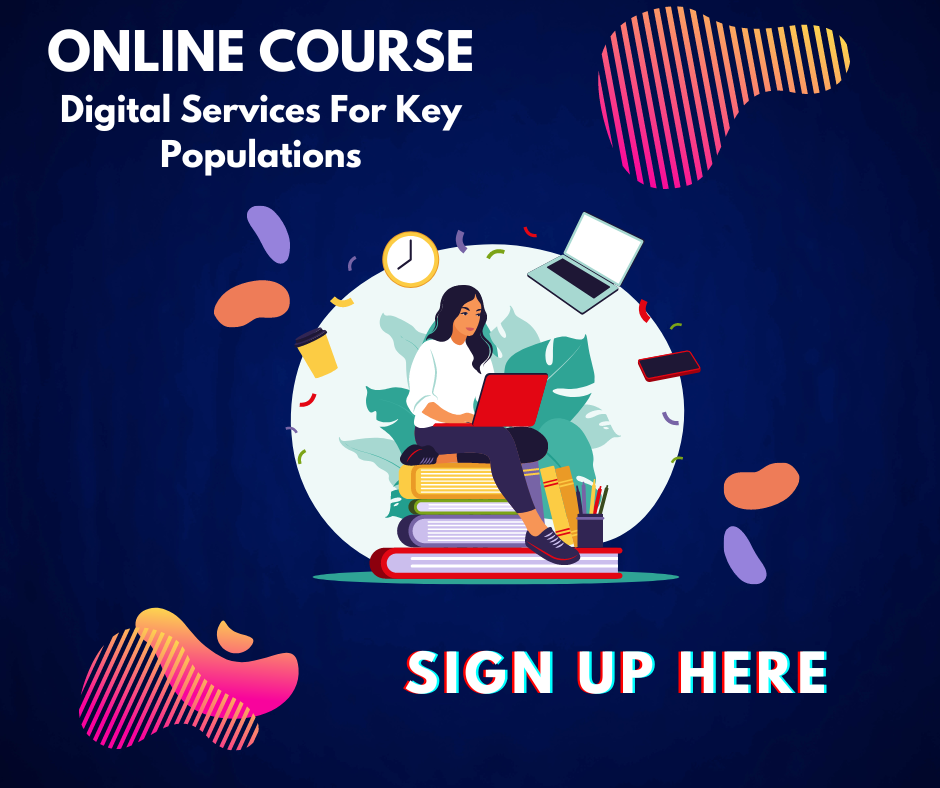
SIGN UP FOR FREE ONLINE COURSE «Digital Help: Services For Key Populations»

Sign up for the course HERE before June 30.
Who is this course[1] for and why?
This online course is dedicated for NGOs and public health institutions providing digital or remote services for key populations, as well as for organizations that are just planning to introduce such services. The purpose of the course is to build capacities of outreach workers, social workers, psychologists, and other specialists who are involved in provision of online/remote services, and managers of those programs, for better quality of the services.
This course has been designed to help organizations in providing direct online help for key populations. During the Covid 19 pandemic digital tools turned out to be important means of reaching members of vulnerable groups. The main aim of the course is to provide participants with the basic knowledge on the core elements of providing digital services for key populations.
There is no one tool that fits all needs. There are many specialized tools, and they are constantly being developed, improved, or fixed. A tool used by one organization may not fit the requirements of others. Therefore, the main objective of this course is to show how to properly select digital tools and evaluate their usefulness.
Before details of tool selection, we will show how using Internet based interventions can be an effective approach to evidence-based work with key groups and individuals. We will then look at another important aspect, computer mediated communication. We will also tackle the issue of confidentiality, privacy, and data storage safety, as well as ethics. The Internet can be a wonderful tool, but online safety is a key issue when providing online services.
What topics will be covered?
- Online communication – specifics of computer mediated communication, rules of netiquette, language in digital services.
- Planning digital services based on understanding of the target audience using Persona tool
- Understanding of possible ways of using available digital tools.
- Online counselling and therapy – framework for practice, structure of effective client session, practicalities of developing online relationship.
- Secure digital services – privacy, confidentiality, and security guidelines, secure software, and hardware, encrypting sensitive data, tips to protect your online privacy and security.
- Ethics and dilemmas of running online services and online services as a source of strain and the work-life in balance.
Learning outcomes
By the end of the course, you will be able to:
- Use online communication effectively for counselling and therapy.
- Describe what a Persona is and identify why and when to use it.
- Construct a Persona.
- Recognize the strengths and weaknesses of various tool categories.
- Compare and contrast digital tools.
- Adopt the use of counselling skills in an online context.
- Protect your online privacy and security.
- Be aware of ethical issues and dilemmas of running on-line services
How will the course be organised?
The program of the course consists of six modules with learning content, self-check tests, additional tips, and practical exercises. For each module, the lesson text has been prepared for reading online and in PDF format for downloading it. We have also included additional materials such as: questionnaires and surveys, videos, and links to external sources on the Internet.
During the course, we plan four online video meetings with a group of all training participants. During these meetings you will be able to get to know your fellow students better, share your experiences, discuss with everyone important topics and ethical dilemmas you may encounter when working online in connection with the provision of online services, and receive advice from the trainers on the course and feedback on the completed assignments.
The course is available in Russian or English.
When will the course take place?
The full course will take one month to complete, in which you will need to allocate 22 hours of your time to learning. You can choose in which month you want to start training, from July till November.
Certificate
To receive certificate of completion, each participant must complete 80% of all tasks on the platform, take part in the four video calls, complete the final assignment.
You can register for the course HERE before June 30.
We will notify you personally about your enrolment and the start date by e-mail before 27th June.
If you have any questions, please contact Igor Gordon by igor@harmreductioneurasia.org
[1] The course was developed by the Global Public Health Network in partnership with the Eurasian Harm Reduction Association (EHRA) with participation of ECOM – Eurasian Coalition on Health, Rights, Gender and Sexual Diversity and the Eurasian Women’s Network on AIDS (EWNA) within the framework of the Eurasian Regional Consortium’s project ‘Thinking outside the box: overcoming challenges in community advocacy for sustainable and high-quality HIV services’ funded by the Robert Carr Civil Society Networks (RCF).
[1] The course was developed by the Global Public Health Network in partnership with the Eurasian Harm Reduction Association (EHRA) with participation of ECOM – Eurasian Coalition on Health, Rights, Gender and Sexual Diversity and the Eurasian Women’s Network on AIDS (EWNA) within the framework of the Eurasian Regional Consortium’s project ‘Thinking outside the box: overcoming challenges in community advocacy for sustainable and high-quality HIV services’ funded by the Robert Carr Civil Society Networks (RCF).